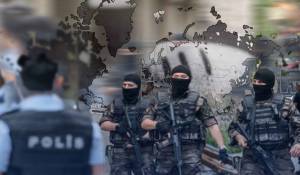
Iftikhar Firdous

February 27, 2026
By | Iftikhar Firdous , Ihsanullah Tipu Mehsud , Riccardo Valle

At least 63 people were killed and more than 200 injured on July 30 after an explosion ripped through the tribal city of Khar in northwestern Khyber Pakhtunkhwa province’s Bajaur district that borders Afghanistan. The suicide attack took place during a political rally staged by the Jamiat-e-Ulema-Islam Fazl (JUI-F), the largest religio-political faction in Pakistan, causing unrest in the country which is set to go to polls in a few months.
Later the Islamic State Khorasan (ISKP) claimed the attack through its official news outlets, Amaq and Nashir News. The statement also identified the name of the attacker as “Abdullah al-Muhajir”. The attack represents the culmination of an intense series of targeted assassinations of JUI-F leadership continuing in Bajaur since 2019 and intensifying since mid-2022.
ISKP claims published via Amaq and Nashir News, featuring also the attacker Abdullah al-Muhajir.
Picture of the ISKP suicide bomber, Abdullah al-Muhajir, published by Islamic State Central’s media entity Amaq News.
In order to understand the twisted rationale behind ISKP attacks against JUI-F, it is important to go back in time to when the militant outfit was not even formed. ISKP’s hatred towards JUI-F, in particular, is inherent in its ideology.
The anti-JUI-F sentiments initially developed within a sub-group of the TTP, led by the then TTP chief, Hakimullah Mehsud, who supported the idea of targeting JUI-F’s chief Maulana Fazlur Rehman and the rest of his party’s senior leadership due to their pro-democracy and pro-Pakistani constitution stance.
The idea caused serious ideological rifts within the TTP, with another sup-group, led by TTP’s deputy chief Maulana Wali u Rehman, condemning attacks on Fazl and his party’s members. Wali even vowed “stern action against any TTP commander found going against JUI-F members” after a suicide attack was carried out to kill Fazl in March 2011.
The differences between the two sub-groups later resulted in infighting. While Hakimullah was killed in a US drone strike later that year, his anti-Fazl sentiments were inherited by a close aide and founding leader of the ISKP, Hafiz Saeed Khan Orakzai, a former TTP militant and the Ameer of the organization in Orakzai district
Saeed was even reprimanded by the TTP’s central command for allowing the assassination of JUI-F scholars who had been vocal against the organization in Orakzai.
Current TTP leader, Mufti Noor Wali Mehsud discusses in one of his books how former TTP members and future ISKP militants from Orakzai and Kurram used to assassinate JUI-F members who opposed the organization.
But as several TTP commanders joined the ISKP under Saeed’s leadership in 2014, the hostility towards JUI-F, combined with Islamic State Central’s virulent takfeeri ideology, provided the newly formed faction with the necessary ideological sanction not to consider JUI-F members as “Muslims”.
Hakeemullah’s anti-Fazl approach was so influential that even to this day, pro-ISKP supporters wish him to be alive as they are of the opinion that under the deceased leader, TTP would have joined forces with ISKP in a general war against religious political parties.
According to ISKP’s propaganda, JUI-F supports democracy, believes in a republican setup, and is in favor of nation-states instead of the Caliphate system. The ISKP further claims that it is “obligatory” to kill JUI scholars as they are allied with the Afghan Taliban, terming them the political representatives of the Afghan Taliban’s Islamic Emirate in Pakistan. The group accuses the leaders of JUI-F of trying to implement Taliban policies in Pakistan and helping them gain international recognition.
Last year, ISKP further articulated its criticism of JUI-F by releasing a series of articles in its flagship Pashto language magazine, Khorasan Ghag, and Arabic language magazine, Sawt Khorasan. Such articles dealt with political-religious discourse, framing a narrative that linked the Afghan Taliban, JUI-F, and Deobandi sect of Islam.
The ISKP further backed its political discourse against JUI-F by issuing a series of fatwas (edicts) released in April 2022 based on new, comprehensive ideological grounds aimed at expelling Deobandi followers from the fold of Islam
Top: Fatwa published by ISKP Sharia Committee in April 2022 on the occasion of the killing of Mufti Bashir. Bottom: Fatwa published by ISKP Sharia Committee in April 2022 on the occasion of the killing of Mufti Shafiullah.
The long trail of assassinations in Bajaur goes back to when the ISKP assassinated JUI-F member Mufti Sultan Muhammad in October 2019 in Khar, Bajaur. In November 2021, ISKP assassinated Sultan Muhammad’s brother, Qari Ilyas, while in April 2023, the group killed JUI-F members Mufti Shafiullah and Mufti Bashir.
It was during this period that the group issued a number of fatwas and messages against JUI-F supporters in Bajaur, adding that the group was targeting the religious party because some of its workers – including Mufti Shafiullah and Mufti Bashir – had been responsible for inciting a mob against Bilal Bajauri, a member of ISKP.
According to the investigation team, Bilal Bajauri is Zeenatullah an ISKP member arrested in 2021 following the assassination of Qari Ilyas with an IED. On the same day of his arrest, Zeenatullah was reportedly lynched by JUI-F workers; multiple videos also appeared online showing Zeenatullah being harassed by several JUI-F workers around him. These videos prompted ISKP to launch an assassinating campaign of revenge by killing all those who were involved in the killing of Zeenatullah and were present in a video. Hence, this case became an example of how ideological and sectarian reasons intersect local, personal dynamics of revenge, combining themselves in a spiral of violence which have been ongoing for the past year and a half.
A message published by local ISKP supporters online in May 2022 asking the people of Bajaur to distance themselves from the Taliban, also promising general amnesty for those militants who repent and want to join ISKP.
A message published by local ISKP supporters online asking the people of Bajaur to distance themselves from JUI-F and Taliban and join ISKP, or support in financial matters.
Since then, many assassinations occurred in Bajaur, whether or not claimed by ISKP. While it appeared that attacks in Bajaur were on the decline after the killing of prominent ISKP commander Hayat Muhammad on August 22, 2022, who was involved in the targeted killings in the area, assassinations against JUI-F members continued to increase in October of the same year.
It was later revealed that Hayat had succeeded in conducting the anti-JUI-F campaign by ISKP commander Shafiullah, who became the new mastermind of the faction’s operations in the tribal district. Between August 2022 and June 2023, he led ISKP and intensified the group’s efforts against the religious party.
Hence, JUI-F members as well as members of the Jamat Ishaat ul Tawheed, another religio-political party active in the region, became primary targets of assassinations once again. On October 10, 2022, Qari Shafiullah, a JUI activist, was assassinated in Mamund; on December 30, 2022, ISKP claimed the assassination of Maulana Azizullah, member of Jamat Ishaat ul Tawheed in Khaar Bazar; on April 9, 2023, suspected ISKP militants wounded Maulana Shafiullah of Jamat Ishaat ul Tawheed in Bajaur; on April 18, 2023, ISKP assassinated Ma’az, son of Mufti Bashir, in Inayat Kalay Bazaar; on June 22, 2023, ISKP assassinated Maulana Noor Muhammad, in Inayat Kalay Bazaar.
However, after commander Shafiullah’s death in June 2023, ISKP stopped claiming attacks in Bajaur, resorting to conducting attacks without publicly taking credit for them to avoid backlash from security forces.
This strategy, in fact, had been already summarized by ISKP’scurrent leader, Shahab al-Muhajir, in one of his writings. Muhajir stated that ISKP’s top priority targets should be religious scholars and tribal leaders who undermine ISKP’s legitimacy in those areas where the group has a strong presence.
Moreover, in light of the pattern of ISKP’s tactics, a series of targeted assassinations is usually followed by a huge, devastating suicide operation, generally committed by the main person responsible for the killings. This resembles the dynamics of events that occurred in Bajaur since 2022, with the long trail of assassinations against JUI-F and Jamat Ishaat ul Tawheed members followed by a devastating attack at JUI-F’s gathering.
Such a tactic has also been employed in other areas of Pakistan. For instance, a similar strategy was used in Peshawar in March 2021, when a suicide attack destroyed an Imambargah in the city, following months of targeted killings. More recently, the group has adopted the same modus operandi in Balochistan.
Since the start of 2023, ISKP had been conducting small-scale attacks in Mastung and Quetta areas, mostly killing members of the Barelvi Islamic sect. The targeted killings culminated in a major suicide attack in Sibbi in March 2023, and ultimately, in the attempted suicide attack against Jamaat-e-Islami (JI) leader, Siraj ul Haq, in May 2023, in Zhob.
Both attacks against JUI-F and JI are sanctioned by the group’s publications, which extensively carried out delegitimizing campaigns against the two organizations. Khorasan Ghag and Sawt Khorasan magazines, for instance, in addition to publishing a series of articles against the Deobandi sect, frequently featured another series against Sufism, Barelvis, and Muslim Brotherhood, a transnational Sunni Islamist organization founded in Egypt, as JI is considered the South Asian offshoot of the latter.
Khorasan Ghag issue 18, February 2023: Cover of the issue featuring an article on JUI-F, Deobandi creed, and Pakistan’s system of government.
One day after claiming the attack, ISKP mouthpiece in the region, Al-Azaim Media, published a 92-pages pamphlet dedicated to its criticism of JUI-F. The text is the apex of the two years-long campaign of delegitimization of the religious party developed by ISKP. Confirming what the group had already stated in April 2022 in two fatwas, the group explicitly says that the attack was planned as a tactic formulated in order to discourage and punish those organizations which participate in elections and celebrate democracy.
The pamphlet is an extensive critique of the post-Independence politics of Pakistan’s Right Wing Parties and begins with criticizing the Jamat-e-Ahle Hadees. It then makes a comparison with the JUI-F’s development as a political party in 4-distinct phases with rhetorical evidence from books and magazines and newspapers since 1947. The document also makes an extensive analysis of all social media accounts of the JUI-F with a breakdown of the party leadership and its relation with the Afghan Taliban, TTP, and Pakistani Government from the lenses of ISKP.
The text itself makes a reference to Bilal Bajauri, claiming that the long trail of assassinations culminated in a suicide attack is part of the revenge campaign initiated by ISKP to avenge its members executed by JUI-F workers, referring to the incident of Zeenatullah.
Remarkably, the pamphlet ends with mocking the various militant groups who condemned the suicide bombing in Bajaur, particularly the Tehreek-e-Taliban Pakistan (TTP). Significantly, this is the first instance of a close back-and-forth between TTP – which had indirectly referred to ISKP in its statement distancing itself from the attack – and ISKP. Progressively, ISKP has been increasing its anti-TTP propaganda in its publications.
The fact that ISKP eagerly produced a detailed book on JUI-F only two days after the attack – even if many of the details have been selected by Khorasan Ghag articles – is an alarming reminder that the group had been planning the operation carefully with a long organizational background. More worryingly, the pamphlet ends with a warning to scholars and religious political parties in Pakistan.
Furthermore, the top leadership of JUI-F and JI, including Fazlur Rehman, Mufti Taqi Usmani, and Siraj ul Haq, have been directly threatened by the group for having links with the Afghan Taliban.
Booklet published by Al-Azaim Media, dedicated to ISKP criticism of JUI-F in the aftermath of Bajaur’s suicide attack. On the page, ISKP directly criticized the TTP.
The Future of ISKP in Bajaur, in Pakistan, and the Region
Since the start of 2023, ISKP has been carrying significantly fewer attacks compared to the same period in 2022. However, the attacks this year have been large-scale ones. Despite some success achieved against the group both in Afghanistan and in Pakistan ISKP’strend of attacks remains the same as in 2019-2020 when seen from a long-term perspective. The group continues to exercise the dissimulation, hit-and-hide tactic adopted since the dissolution of its territorial hold in Afghanistan, giving the group the ability to morph itself according to the situation on the ground, even if in hostile territory.
The latest attack in Bajaur constitutes the first major ISKP attack against JUI since a similar suicide attack in Quetta in 2017, which nearly killed Senator Maulana Abdul Ghafoor Haider, a senior leader of JUI-F.
If after six years, despite enduring major setbacks in terms of men and material, ISKP is able to replicate a similar attack, showing how the group has been evolving itself and has been able to remain on its path of war despite all odds.